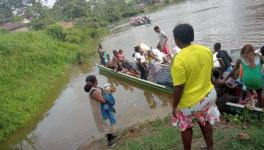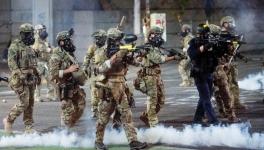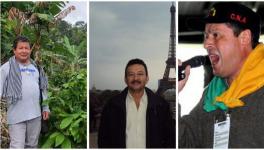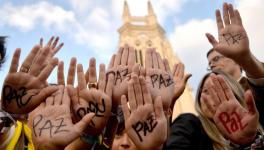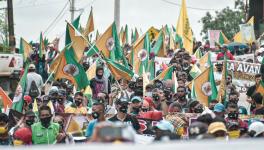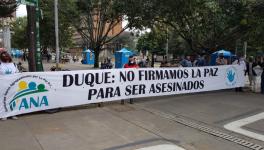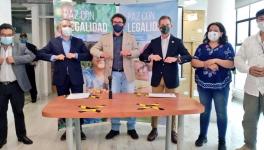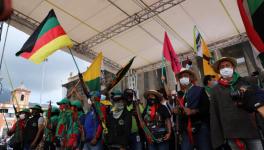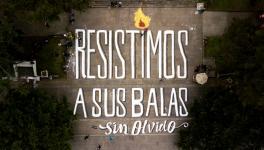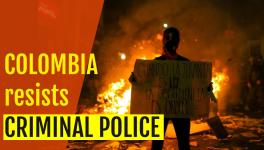Julián Gil: “Our Triumph and Victory Are in the Hope and Strength of Being Together”
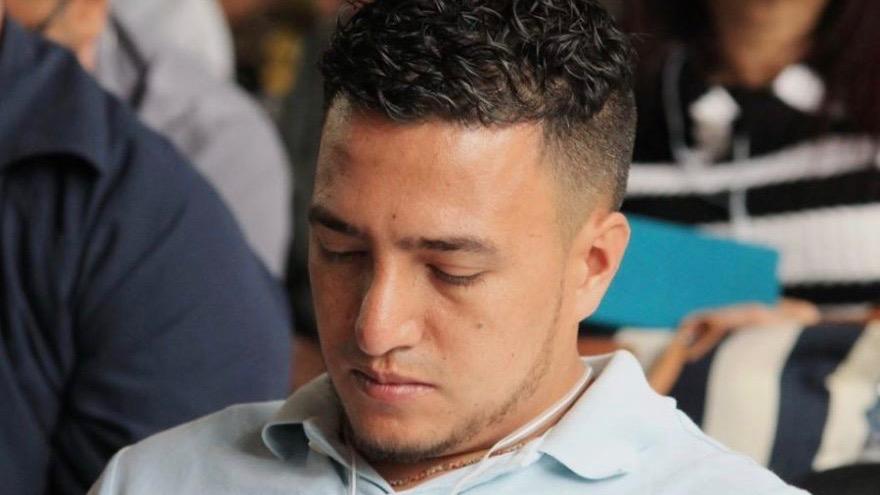
Julian Gil is a Colombian political prisoner. He was detained two years ago today while working as the Technical Secretary of Congreso de los Pueblos (the People’s Congress). Since then, his family, his movement and his friends from Colombia and the whole world, struggle against this case of criminalization and trumped up charges that the Colombian state created against him. The following is a text Gil himself wrote about the two years that he has been unjustly detained.
Our triumph and our victory should be the hope and strength in being together…
It has been more than two years since the last time I hugged Manolo and Juan; since I shared a lunch with my dad and a lunch with my brothers; since I exchanged words and hugs with my comrades and friends.
Days before my arrest I was able to listen to the wise voices of the peasant, labor and Indigenous leaders that have organized themselves and are defending their territories in opposition to the neoliberal projects that destroy mother earth and the social fabric. We were meeting in the land where Manuel Gustavo Chacón (*) fought, where the women’s organization has not stopped their resistance and the youth have not stopped dreaming of a different world, in the environmental, mining and energy dialogue as part of the Agrarian, Peasant, Ethnic and People’s Summit.
In those days I was also in the neighborhood José Antonio Galán in the district of Bosa where we were working on the “Pre-Icfes” (ICFES is a national university entrance exam) course called ‘Let’s go to the Public University.’ In this course young people prepare to access higher education. I helped out in the area of critical reading and I would tie a megaphone to my motorcycle and ride on the streets of the neighborhood inviting people to join. We also were joining the forces of many people who dream and we started a campaign to collect resources to build a office of Congreso de los Pueblos in the neighborhood. We grew lettuce, cilantro and ruda in the yard, and until the last day we would all eat lunch together and analyze the tragicomedy of the country.
The surveillance and persecution across the country had gotten worse against grassroots organizations and in the office of Congreso de los Pueblos every day there was surveillance with cars, motorcycles and even agents dressed as civilians recording all those that entered and exited. The pressure did not dehumanize us and we shared food and warm layers with some alleged homeless people, who we didn’t know were watching us and taking photos of us watering the lawn or chatting in the evening. The police would come to our houses and apartments supposedly in response to denouncements of intrafamilial violence. When we talked on the phone we knew we had to say hi not only to our friend on the other end, but also the intelligence agent that listened to everything and even joined us for beers at the local bar and to play games at the tejo court. The untimely questions and inspections on the street where they would ask why one was waiting for the bus or what time it was. These were the normalized situations that became the absurd reality of political persecution.
During the first days that I spent in the cell of the station in Facatativá (a municipality 30 km outside the capital Bogotá), I still did not perceive the dimension of what was happening, but I hated with all of my might the darkness of this place, the cold floor where I had to sleep, and the way the police treated us as criminals. Even more so when I heard the voice of my sister, my mother or of some comrade who brought us breakfast, messages from friends or a book to pass the time. I tried to hide the collapse talking about the dirtiness of the place – here we were only missing a broom, soap and bleach to make everything okay – to see if some humor could sneak through the bars of the three doors that separated us, and they would know that this bad moment would end soon.
In the afternoon I attempted to distract my anger, like someone who throws a bone to an angry dog, by reading “Memory of Fire” by Eduardo Galeano that had arrived to the cell. In the part called Flying it says: “The tree of life knows that, whatever happens, the warm music spinning around it will never stop. However much death may come, however much blood may flow, the music will dance men and women as long as the air breaths them and the land plows and loves them.” Galeano calmed our rage momentarily and he weaved it together with the historic rage and after two nights or two moments without light, a way of communication was established with the neighbors in the adjacent cell, that were there for other reasons, but also suffered the disregard of the self-declared defenders of law and order.
The first Sunday without sun, the presidential dispute was defined in the second round and with great curiosity some of my captors wanted to know what I thought about the confrontation in the polls: If [Gustavo] Petro wins, do you think that a guerrilla fighter will reach the government? and those people on the left, will they know what to do with the power? With a smile in response to the “curious” concerns of the agent, I remembered that only a few days ago I had used my ID card to vote and I had only done it under pressure from my parents that had promised we would go for a walk in the neighborhood that they lived in during the first few years that they arrived in Bogotá. The agent concluded that the best for everyone in the country was that the puppet with the white hair-dye should win. And the response that came out best was another question: And for you in these 20 years, who has won with the government of the paramilitaries? We exchanged glances of knowing that two we are two different people and the silence ended the conversation.
The agents in the station, with the intention to show who had the power of the electrical switch and the bathroom keys, would turn off the light to stop us from reading and refused to open the cell gate to enter the bathroom in the morning. Their words expressed hatred distilled by decades of police violence, and as if following a legacy inherited from the Chulavitas (**), the uniform and the club gave them enough authority of trial and punishment to state that having studied in a public university or being part of a social organization, were sufficient reasons to be accused of being a guerrilla fighter and as such guilty of whatever expression of dissatisfaction in the country.
Ten days passed and they brought us to the La Modelo prison (in Bogotá) but because of the overcrowding, some unions of the National Penitentiary and Prison Institute impeded the admission of new inmates, so we had to return to Facatativá. I had hoped to find wedged in one of the walls a letter with a sun that Manolo had drawn and I had carelessly left. But our almost-cellmate Hasbleidi told us the hostile truth – the cops had picked up all of the pages that we left there, saying: these f***ing guerrilla fighters do not know that they will be in prison for a long time and there they will learn how things work.
When we arrived to La Picota I was panicked. This became worse when they confined more than sixty people for one day and one night in the cells called primaries. There was a pyramid of foam pads whose original pink color had become multiple variants of combinations between brown, green and black and the worst is, this is what we would have to spend the night on. Some of us exchanged glances of mutual understanding, the anguish and fear was perceptible in different tones. After a few minutes passed, along with four others that wanted to protect the blanket or book that they had with them, we took refuge in the corner of a rectangular cell, which was not very strategic, because it was right next to the “bathroom,” and as the hours passed it became covered and it made breathing impossible. Instinctively we began to sleep for hours, in shifts while someone was on watch for any strange movement. The night was long and accompanied by the shrieks of the rodents that wanted to attack the bins looking for scraps of food that were left over from the boxes that we were given when we entered, and that many of us had eaten from selectively due to the distrust that we felt with the chicken with red, bloody veins, dirty potatoes and the few grains of white rice.
The next day when it got dark again, they assigned us a block and fearful that the whole prison would be like the cell from the first night, I took the mattress pad with a blue covering that they assigned me, the plate and cutlery, and a brown blanket, and I followed the guard that would show me how to arrive to the block. I went up around eight flights of stairs, some 600 steps, until I arrived at a closed gate and from where looking out the window you could see the mountain full of lights. Later I would find out that it was the Molinos neighborhood, where my Aunt Luz and my cousins Diana and Jhon had lived in childhood and where I had gone a couple times to visit, and where only a couple months prior, we had commemorated the loss of Carlitos Pedraza. On the other side were the bars like from a gringa movie, with secure locks, security cameras and at the back a wall that was painted with the numbers 11 and 14. After standing there for a couple of minutes, not knowing what to do, a guard appeared with a more mischievous face than all of the inmates that had been on watch with me the night before. An experienced prisoner would have guessed that he was waiting to make his first collection to accommodate me in a cell where the blanket, book and plate I carried would not be at risk.
As the days passed, and amid this turbulence, the high spirits of the family, of the comrades, and of some prisoners in solidarity, my anguish began to dissipate and I began in some way to understand the new moment that I was facing in this incommensurable existence; every visit, every call, every letter and every greeting became the necessary and sufficient force to confront this challenge.
The world does not stop and the lessons do not either. As the months went by, and with a paused and calm look, I began to evaluate and reflect on my political participation in social processes, the course of my personal life and the destinies of the struggles for transformation and social change. And so, the desires to not give up and to fight continued and, motivated by the process in my neighborhood, we created three libraries, one in block 11 where I was for the first two months, another in block 12 where I currently am, and another in block 16 where there are also political prisoners, students of the National University. Moved by the complex situation of state and family abandonment suffered by many who live here, some friends from the Bosa parish and some close friends from the social movement, began a campaign to collect products of hygiene, calling on solidarity when mass was over or trading books for soap and toilet paper. The Committee of Solidarity with Political Prisoners, maintaining its founding mission, also strengthened its educational support and legal support with a space of political education in human rights for people deprived of their freedom. Then with the support of some professors from the National University and the National Pedagogical University, the Pasos Foundation and the People’s Legal Team organized the seminar of carceral and penitentiary rights. These experiences have given the necessary strength to be able to face the recent intensification of the contradictions.
With quarantine, the days have become longer and the counting of time about when the next visit will be has had to change. Now as they say in many parts, any day is Monday or Sunday. We have had to learn to survive without seeing, or hugging the people that we love. However, the notable aspect amid this adversity is that the tragedy experienced by thousands across the world has been made public knowledge, as well as the pressing need to change the practices and institutions that are against life and dignity.
In these two years, we have seen from all angles how the violence directed towards the social movement has increased, incarcerating and assassinating community leaders, making trials by media and above all demarcating an anti-democratic wave, characterized by the buried closure of the political participation of the distinct proposals for the country. It is as if the days are changing us and they are teaching us that the daily struggle of life makes sense and it is those of us who do not stop dreaming and loving life who must transform the world.
Of all this time I can say with full transparency that I love the bold words that transform and the bold people that do not stop saying these words across continental distances, breaking walls and bars, and above all shaping new realities and possibilities; like my mother, who is sewing face masks -for the prisoners- scolding her dog to not mess up the thread and my dad cutting the water resistant cloth, obstinately they do not stop teaching me to fight back; the tireless fighters Aleja, Blan, Angie, Blanquita, Laura, Joha, Cristina, Jennifer, Gloria and many more, that weave networks of care, resistances and utopias; the neighbors who have stood in solidarity and the lifelong friends that from their lives dedicated to work, to taking care of their families and the limitless love that shape the constellations of possible universes. I will also say that I am learning that through building unity we are seeing the ways of resistance and the diverse forms that we can keep warm in the cold days and accompany each other on the ones of confinement.
At seven hundred thirty one days of physical distance I send to my brothers, family members and comrades these vital lessons and challenges to continue, without before saying that we cannot let one day pass without us contributing a stitch to the fabric of hope to change our blocks, neighborhoods, towns, schools, universities, workplaces, families and above all the winds that do not stop bringing hunger and displacement.
Always forward in defense of Joy and Hope!
We will see each other in the neighborhood, town and University!
To be a social leader is not a crime!
(*) Manuel Gustavo Chacón was a student leader, trade union activist and musician who was assassinated by the Colombian army in 1985.
(**) The Chulavitas were one of the earliest paramilitary squads of the Conservative Party of Colombia.
Get the latest reports & analysis with people's perspective on Protests, movements & deep analytical videos, discussions of the current affairs in your Telegram app. Subscribe to NewsClick's Telegram channel & get Real-Time updates on stories, as they get published on our website.









